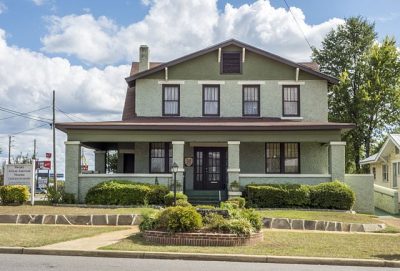Home » Alabama Museums »
2601 Bryant Drive and Lurleen Wallace Blvd. S Tuscaloosa, AL 35401
Located in The Murphy-Collins House-Home of Tuscaloosa’s first licensed black mortician, features the lifestyle of affluent blacks during the early 1900s, built in 1923. National Register of Historic Places - Tuscaloosa County, Alabama
View displays on local history, Murphy family memorabilia, African art and artifacts.
The Murphy African American Museum is a historic site located in the heart of downtown Mobile, Alabama. The museum was founded in 2001 to preserve and celebrate the rich culture and history of African Americans in Mobile and the surrounding region. The museum is named after the Murphy family, one of the most prominent African American families in Mobile during the 19th and 20th centuries. The museum’s collection includes artifacts, photographs, and documents that highlight the contributions of African Americans to the city’s history and culture.
The Murphy African American Museum is housed in a beautifully restored historic building that was once home to the first black-owned funeral home in Mobile. The museum’s permanent collection includes a variety of exhibits that showcase the achievements of African Americans in Mobile and the surrounding area. One of the most notable exhibits is a replica of the 19th-century slave quarters that were once common in the Mobile area. The exhibit provides visitors with an immersive experience of what life was like for enslaved people in Mobile and how they contributed to the city’s growth and development.
The museum also features a rotating series of temporary exhibits that highlight specific aspects of African American culture and history. Recent exhibits have included “The Civil Rights Movement in Mobile” and “African American Women in Politics.” The museum’s staff is committed to creating exhibits that are both informative and engaging, with interactive elements and multimedia displays that appeal to visitors of all ages.
In addition to its exhibits, the Murphy African American Museum also hosts a variety of cultural and educational programs throughout the year. These programs include lectures, workshops, and performances that showcase the music, dance, and other artistic traditions of African Americans in Mobile and the surrounding area. The museum also offers educational programming for students of all ages, including field trips, classroom visits, and summer camps.
The Murphy African American Museum is an important cultural institution in Mobile and the surrounding area. It serves as a reminder of the important contributions that African Americans have made to the city’s history and culture, and it provides a space for dialogue and learning about the ongoing struggle for equality and justice. The museum is committed to promoting diversity, inclusion, and social justice through its exhibits, programs, and community outreach efforts.
Visitors to the Murphy African American Museum will leave with a greater understanding of the rich and complex history of African Americans in Mobile and the surrounding region. The museum’s exhibits and programs provide a unique perspective on the challenges and triumphs of the African American experience in the South, and they offer a valuable opportunity for visitors to learn about and engage with this important aspect of American history and culture.
In conclusion, the Murphy African American Museum is a vital cultural institution that celebrates and preserves the history and culture of African Americans in Mobile and the surrounding region. With its engaging exhibits, educational programming, and commitment to social justice, the museum provides a unique and valuable resource for visitors of all ages and backgrounds. Whether you are a local resident or a visitor to the area, the Murphy African American Museum is an essential stop on any tour of Mobile’s cultural and historical attractions.
Image via wiki by greg .org

